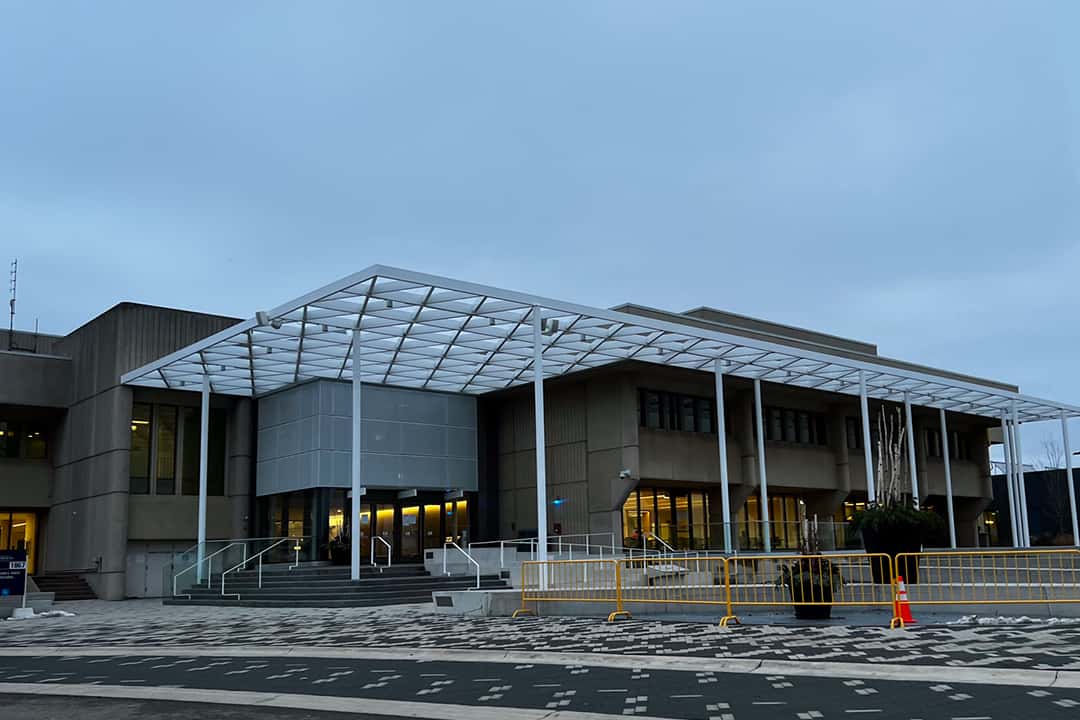On September 10 and 12, UTM held its first Academic Affairs Committee (AAC) and Campus Affairs Committee (CAC) meetings, respectively, for the 2024–2025 academic year.
In the meetings, members discussed enrolment numbers, new course offerings, changes in UTM’s infrastructure, and student support. Both meetings took place in the council chamber room in the William G. Davis Building.
Enrolment numbers
At the AAC meeting, board members discussed UTM’s enrolment figures for the current academic year. The total enrolment reached 11,982 undergraduate domestic students — slightly up from last year’s 11,448 students — although the number of new domestic students decreased from last year’s 4,412 to 4,239. Despite this drop, Professor Nick Rule, vice-principal academic & dean, expressed his satisfaction with the overall stability of UTM’s enrolment this year.
Rule also reported that UTM will likely be “at 80 per cent of our international [student enrolment] target” by November 1. He attributed much of the shortfall to geopolitical tensions between the Canadian government and the Indian government affecting Indian international student applications. Indian students make up the second-highest international student population at U of T.
Recently, Marc Miller, the Minister of Immigration, Refugees, and Citizenship, announced new immigration policies that will result in a further 10 per cent reduction in study permits in 2025 while maintaining the new level for 2026.
The federal government aims to provide 437,000 study permits in 2025 and 2026, representing a 36 per cent decrease from 2023. UTM will be abiding by these rules and reducing the capacity of international student enrolment.
Program changes and new courses
During the AAC meeting, board members discussed proposed minor changes to undergraduate programs. The changes will impact six programs in humanities, five in sciences, and four in social sciences, as well as courses within these disciplines. The changes are meant to “reflect important modifications to maintain the quality, currency, and rigour” of the programs and courses and are set to be effective starting September 2025.
According to Rule, a new doctoral program in media and communications technology is currently under review, while a new specialist program in computational physics and a minor in logic for philosophy is expected to be introduced in the spring of 2025.
UTM also plans to expand its support to graduate students. Professor and Vice-Dean of Graduate and Postdoctoral Affairs Ajay Rao hopes to consolidate academic units’ graduate resources to reduce their workload.
“This approach is already helping us reach out to graduate students at the start of the new academic year to help them successfully navigate their time here on campus,” said Rule.
A major project is creating an Institute of Forensic Science, which will be a multidisciplinary unit designed to foster research and teaching to support UTM’s forensic science faculty and academic programs.
Infrastructure upgrades
At the Campus Affairs Committee (CAC) meeting, Chief Administrative Officer Deborah Brown highlighted UTM’s achievement of a gold star rating in the Sustainability Tracking Assessment and Rating System (STARS) — a self-reporting program for universities to measure sustainability performance — reflecting their efforts to commit to sustainable campus operations.
New infrastructure projects include a new student residence expected to be completed in 2026 and a central utilities plant, originally planned to be built under the F2 building. A Pre-Engineered Building will be built for teaching and research streams — including forensics science, biology, and robotics programs — that require a garage, warehouse, or workshop-style spaces to accommodate vehicular and robotic equipment. The building is projected to be completed in November 2025.
UTM added motorcycle parking in parking space P5 and an eco-friendly car station in parking space P4, and is revitalizing the lower P9 parking lot for additional space. These new infrastructure changes will be later revisited by the committee.
The meeting also touched on classroom upgrades in Deerfield Hall, the UTM library, and the Communication, Culture, Information and Technology labs. UTM also upgraded older wi-fi access points with newer technology and is investing in information security to mitigate “cyber risks.”
Student support and wellness
During the CAC meeting, Assistant Principal of Student Services and Dean of Student Affairs Mark Overton outlined UTM’s continued focus on supporting first-year, first-generation, and undecided students.
However, Overton also addressed concerns about the need to provide more graduate student support. While the campus has existing programs for graduate students, he also mentioned the need for more tailored services to ensure graduate students feel comfortable within the university.
“We strive to provide support… to [both] undergraduate and graduate students… We need to provide more tailored programming so the graduate students feel comfortable engaging,” said Overton.
He noted that UTM only has about 800 graduate students and that “[UTM] does a pretty good job of providing local services and connecting those students with the St. George campus, which has about 20,000 graduate students.”
Overton highlighted the Student Services Hub as a starting point for students seeking advice and support. He continued that the hub is not only intended as a resource for students but also faculty, staff, and other community members. UTM is also launching the UTM RecZone outdoor field and courts project, which will expand students’ recreational space and wellness opportunities.
“We really want students who come and engage with us to get great referrals [from] other experts on campus,” said Overton.



No comments to display.